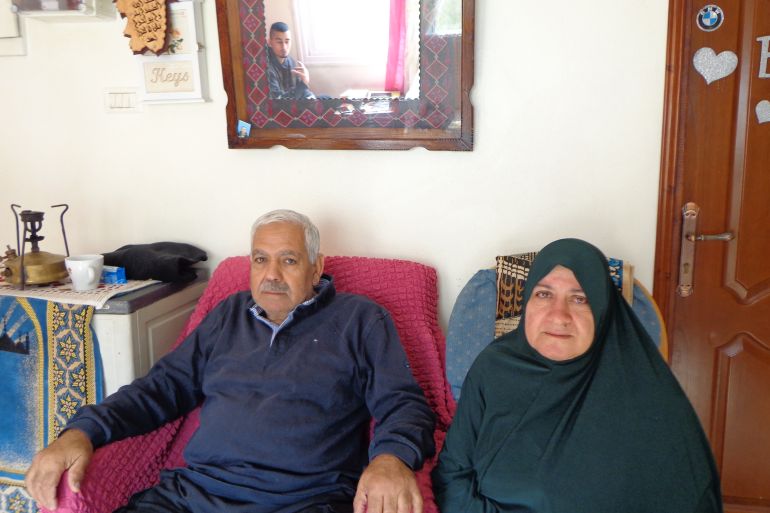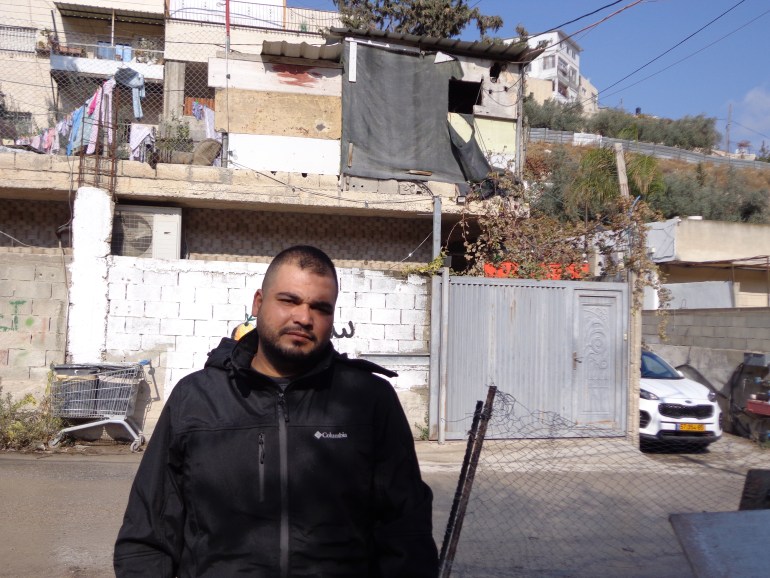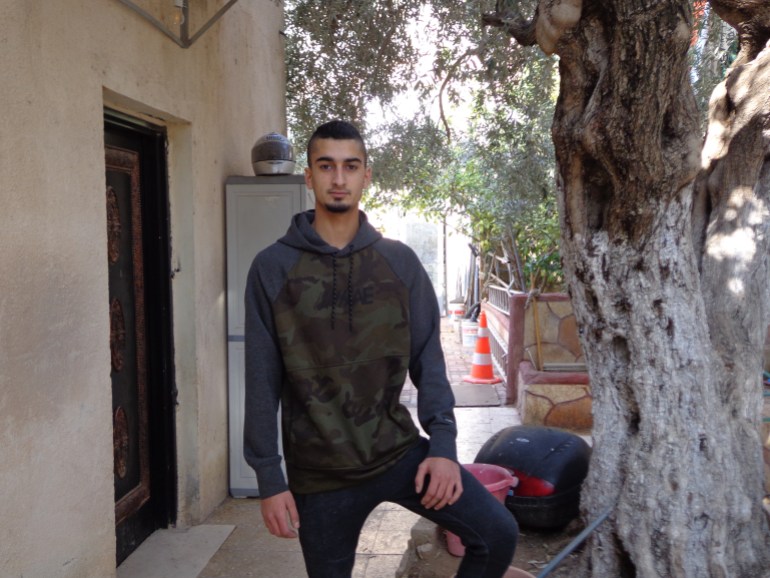Palestinian families face new Israeli demolition threat in Silwan
An Israeli court to decide if some 80 homes in occupied East Jerusalem could be demolished to make way for a park.

Silwan, Occupied East Jerusalem – About 84 Palestinian homes in the Wadi Yasoul neighbourhood of Silwan in occupied East Jerusalem are facing demolition to make way for enlarging an Israeli national park in the area.
Fakhri Abu Diab, a member of the Silwan Lands Defence Committee, said the threats against homes in Silwan is part of an attempt to target neighbourhoods in the “Holy Basin” where Israel is forging ahead with the City of David theme park.
Keep reading
list of 3 itemsEU-funded Palestinian school faces Israeli demolition
Demolitions begin in occupied East Jerusalem’s Silwan
Some 600 Palestinians living there will be rendered homeless if an Israeli court rules in favour of the demolition.
Diab said that if the Wadi Yasoul expropriation went ahead, it would be the second-largest forced displacement of residents in Jerusalem since the 2019 forced displacement in Sur Baher’s Wadi al-Hummus neighbourhood when more than 10 residential buildings were demolished, making hundreds homeless.
Forced displacement, or unlawful transfer of civilians in occupied territory, violates the Fourth Geneva Convention and constitutes a war crime under the Rome Statute of the International Criminal Court.
Diab said urgent international action is needed to stop Israel’s demolitions in Wadi Yasoul, which lies just south of Jerusalem’s Old City.
Ziad Qawar, the lawyer representing the affected families, told Al Jazeera it is unclear when Jerusalem’s District Court may issue a ruling over the case, but that it could be in the coming days or weeks.
Qawar appealed to the district court on November 18 against an earlier municipal court ruling that greenlighted the demolition in Wadi Yasoul, home to more than 1,000 Palestinian residents and comprises some 310 dunums (31 hectares).
Engineer demographic change
In 2019, the Israeli-controlled Jerusalem Municipality demolished 12 residential buildings, and a horse stable, in Wadi Yasoul, displacing more than 70 residents.
“It is a very difficult from a legal standpoint because as we appeal the pending demolitions, and hope the judge will show some compassion, we will also try to get planning for the homes approved so if they are demolished, they can be rebuilt in the future,” Qawar told Al Jazeera.
The owners of the threatened homes, and other buildings, were given repeated notices by the Israeli authorities over the years that the buildings would be destroyed because they were built without permits.
NGOs and human rights organisations have repeatedly released reports on how the Israeli authorities issue very few building permits to Palestinian residents, despite extreme overcrowding, while illegal Israeli settlement construction is simultaneously encouraged with economic incentives.

At least one-third of all Palestinian homes in East Jerusalem lack an Israeli-issued building permit, potentially placing more than 100,000 residents at risk of displacement, according to the United Nations.
Critics argue this is part of a plan by the municipality to engineer the demographics of Jerusalem in favour of a Jewish majority.
“Immediately after occupying the area in 1967, Israel unlawfully annexed thousands of hectares in and around Jerusalem,” according to a report by Israeli rights group B’Tselem.
“Ever since, it has instituted policies designed to drive Palestinians out of the city and to create a demographic and geographic reality that would frustrate any challenge to Israeli sovereignty there.
“The policies, which disrupt every aspect of life, include isolating East Jerusalem from the rest of the West Bank and deliberate underdevelopment and under-servicing that result in overcrowding, poverty and substandard infrastructure,” the organisation said.
Living in fear
Medical student Yahya Shabaneh, 18, has delayed his dentistry studies in Ukraine to be with his family in Wadi Yasoul.
Not only is his family home threatened with pending demolition but also is the medical centre that his father, who is a doctor, runs in the neighbourhood.
Shabaneh said that the centre handles thousands of patients. “My brother, who works as the general manager of the centre, received a notice from the municipality last week warning of the pending demolition.
“In addition to residents in the area losing a quality medical centre, the staff members will also lose their jobs and need months to try and find other work. It’s not easy,” said Shabaneh. More than 40 staff work at the medical centre, Shabaneh said.
He added that his family, staff and neighbours, whose homes are also under threat, are living in fear.
“We don’t know what will happen in the next 24 hours when the bulldozers will come with the soldiers to destroy our homes and our livelihoods.”

Forcible displacement
On November 23, Israeli forces demolished a three-storey home in Sur Baher. Israel’s demolition of 10 residential buildings in Sur Baher in 2019 drew condemnation from Amnesty International.
“For decades Israel’s authorities have taken arbitrary and disproportionate measures in the name of security to expand their control over Palestinian land and push Palestinians out of areas they consider strategic, forcibly displacing entire communities and unlawfully destroying tens of thousands of homes,” Amnesty said in a press release.
Addressing the threat against Wadi Yasoul, Diab of the Silwan Lands Defence Committee added that it was currently the most dangerous demolition and eviction threat in Silwan.
In April, more than a dozen families were given 21 days to demolish their homes themselves or pay thousands of dollars for the municipality to do the job in the Bustan area of Silwan.
Due to international pressure following intensive media coverage, some of the demolitions have been put on hold temporarily.
Former school head teacher Abu Thaer Marajha, 69, and his wife Sabah, 60, live together with 16 family members on several floors of their building in Wadi Yasoul.
Abu Thaer has lived there for 28 years, bringing up his children, and they in turn bringing up his grandchildren, in the family building.
Israeli authorities have been trying to evict the Marajha family for more than 20 years.
“I tried more than 10 times to get a building permit for the home but without any success,” Marajha told Al Jazeera.
“I’ve paid about 250,000 Israeli shekels [$79,711] in fines over the years for building the house without a permit.”
Shabaneh, the medical student, said the cost for residents to fight the evictions and demolitions was enormous.
“Not only do people have to pay fines for building without permits, if they don’t demolish the homes themselves the municipality carries out the demolitions which can cost up to 100,000 shekels [$31,884] for each demolition,” he said.
‘What choice do we have?’
Muhammad Shweiki, 32, said 14 of his family members were being made homeless in their multi-storey home in Wadi Yasoul.
“I’m married with two young children, and I don’t know where we will live if our home is destroyed,” Shweiki told Al Jazeera.
The Shweiki family said they previously submitted a town plan to the municipality and undertook to organise the neighbourhood, but all their initiatives were rejected by the municipality. The Shweiki family believes the refusal was for political reasons.
Despite the fear, uncertainty, and impending loss, the residents have resolved not to give in.
Abu Thaer Marajha said his family was going nowhere.
“If they destroy our homes, we will clean the debris away and erect tents to live in on the remains of our homes,” Marajha said.
Shabaneh said his father and the other staff at the medical centre were desperately seeking to move the centre elsewhere, including their home even if temporarily. “What choice do we have?” he said.
Advocate Qawar described the pending demolitions and evictions as “racist and dangerous” developments and promised to keep fighting through the courts.